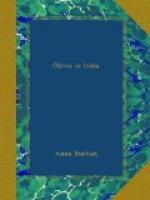Anne comes from Skye, and often tells me about water-horses and such-like odd denizens of that far island; and I find her soft Highland speech, with its “ass” for “as” and “ch” for “j,” very diverting; but this time I wasn’t amused.
“But nothing has happened, Anne. What are you talking about? Where is my brother?”
“Mercy on us all, how can I tell? The mistress and the young gentleman has never come in, and the master says to me, ’Fetch me my flask, Anne,’ says he; and fetch it I did, and he drove away, an’ I’m sure as I’m sittin’ here I didn’t see the water-horse for nothing. What does a flask mean but an accident? Och—och, and a nice laughin’-faced young gentleman he was, too.”
If life is going to contain many such half-hours I don’t see how I am to get through it with any credit. I left Anne—whom at that moment I hated—to seek information from the servants, which she did with a valiant disregard of her entire lack of knowledge of Hindustani, a language she stubbornly refused to learn a word of. The last I saw of her she had seized the khansamah’s young assistant and was shouting at him, “Chokra—ye impident little black deevil, will you tell this moment, has there been an accident?” Backwards and forwards I went in the verandah, then down the steps to the road, straining my eyes to see and my ears to hear something—what I did not know. From the garden the scent of the roses and mignonette came to me in the soft Indian darkness. I ventured a little bit along the road, too anxious to remember, or, remembering, to care, that I had no lantern, and that at any moment I might tread on a snake. I could only think of one thing, and how often I pictured it! Mr. Royle coming back, and the natives carrying someone—someone who didn’t laugh any more. The odd thing was I didn’t seem to mind at all what happened to kind Mrs. Royle. It was Boggley, and only Boggley, that mattered to me. Of course nothing did happen to anyone. It isn’t when one expects and dreads it that tragedy comes. Tragedy comes quietly, swiftly. I remember going to see a fisherman’s widow in a little village on the stormy east coast. She told me of her husband’s death. “I had his tea a’ ready an’ a bit buttered toast an’ a kipper, but he never cam’ in.” That was all—“He never cam’ in.”
When our wanderers returned they were rather amused than otherwise. The horse had given trouble and ended by kicking the trap to pieces, and they had to walk part of the way home. Quite simple, you see; but the first opportunity I looked in a mirror to see if my hair had not turned white in a single night, as men’s have done through sudden fear. It hadn’t; but I did dream of a water-horse with “an awful starin’ white face.”




